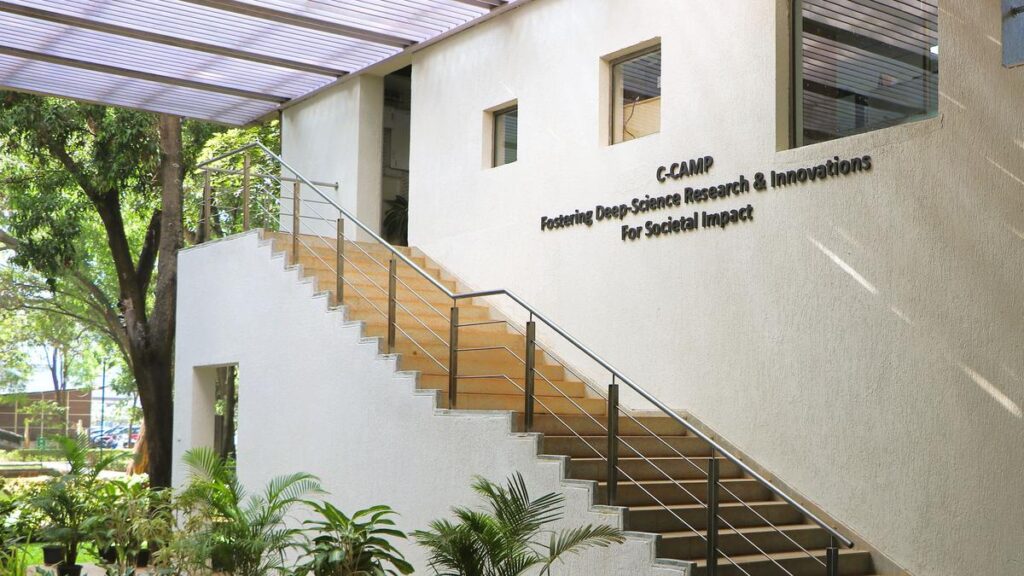
Centre for Cellular and Molecular Platforms (C-CAMP) in Bengaluru. C-CAMP said that the national Anti-microbial Resistance (AMR) Challenge was launched in August 2024.
| Photo Credit: SPECIAL ARRANGEMENT
Three Bengaluru-based institutions, including the Indian Institute of Science (IISc.), are among the winners of the Centre for Cellular and Molecular Platforms (C-CAMP) Anti-microbial Resistance (AMR) Challenge 2024-25.
C-CAMP said that the national AMR Challenge was launched in August 2024. They received about 200 applications from innovators and start-ups across India for funding and ecosystem support to enable scale up, production, adoption and societal integration of winning solutions to tackle AMR in the environment.
The nine winners
Of them, nine were declared winners of the C-CAMP AMR Challenge 2024-25.
The winners are:
- Indian Institute of Science (IISc) for tackling AMR emergence through effluent treatment using robust catalytic enzyme mimetics. The MONZymes based technology, as developed by Dr. Subinoy Rana and his team, is capable of effectively degrading residual antibiotics from effluent wastewater and also exhibit antibacterial activity, through advanced (photo)catalytic activity.
- Foundation for Neglected Diseases Research (FNDR) for developing a device to deplete antimicrobial residues from wastewater, using a cartridge-based device with a patented mixture of activated charcoal and plant-based materials.
- Biomoneta Research Private Limited: qAMI (Quantitative Airborne Microbial Index) for coming up with a singular technology combining detection of air-borne total microbial load and pathogenic microbes in hospital set-ups, using AI/ML platform and encompassing different microbial attributes, combined with the classic microbiological approach.
- D-NOME Private Limited for its D-NOME’s pocket PCR device, which can help in rapid and accurate on-field detection and identification of Antibiotic-Resistant Bacteria (ARB) & Antibiotic Resistance Genes (ARGs) in aquaculture farms and other wastewater sources.
- Vividew Innovations Private Limited for its novel innovation to remove residual antibiotics & antibiotic-resistant bacteria from wastewater in hospital sewage treatment plants (STPs).
- Diagopreutic Private Limited for its detection of residual antibiotic and pathogen identification in water samples from aquaculture farm effluents, using a colorimetric method, based on the differential nitro-reductase activity of the bacteria and their ability to grow in presence of the specific antibiotic.
- Mylab Discovery Solutions Private Limited for its rapid detection of pathogens from wastewater samples, and detection of environment-related ARGs. The technology involves an in-house developed nucleic acid extraction kit and an advance multiplexed quantitative RT-PCR technology, capable of identifying a diverse array of pathogens as well as an extensive spectrum of ARGs.
- Huwel Life Sciences Private Limited: Quantiplus® Environmental Surveillance Kit for Real-Time PCR detection for typhoid and ARGs in environmental samples. The RT-PCR kit detects a wide spectrum of ARGs, as well as the typhoid specific gene along with its resistance genes.
- Amrita Vishwa Vidyapeeth for the development of affordable POT (Point of Testing) device for monitoring of AMR in the environment, by an impedance-based microfluidic device, using a lytic phage-based detection technology. The innovation, as proposed by Dr. Bipin Nair and his team, is capable of detecting and identifying various pathogens of clinical relevance and can be used for rapid and accurate detection of specific bacteria.
Nature of support
The winners will be supported by C-CAMP in India in collaboration with the UK Department of Health and Social Care’s Global AMR Innovation Fund (GAMRIF) to foster the identification and development of world-class AMR-focused innovative solutions to tackle various aspects of AMR in the environment in India, and for the benefit of low and middle-income countries (LMICs).
“Antimicrobial resistance in the environment is a serious issue because of unchecked effluents from agriculture and industry reaching our water bodies, air and land. The problem has assumed alarming proportions across the entire world. I am heartened to see that innovators and scientists in India are developing cutting-edge innovations that hold promise not only in India and LMICs, but for the world,” said Prof. Ajay K. Sood, principal Scientific Adviser to the Govt. of India.
Published – April 29, 2025 12:28 pm IST

